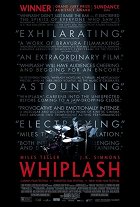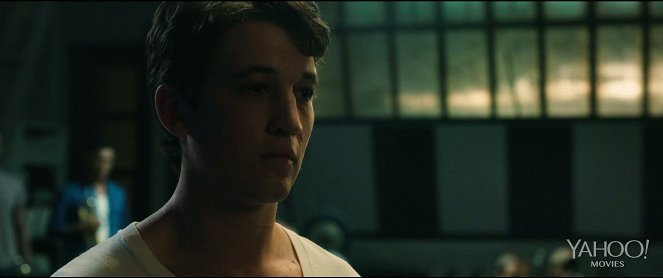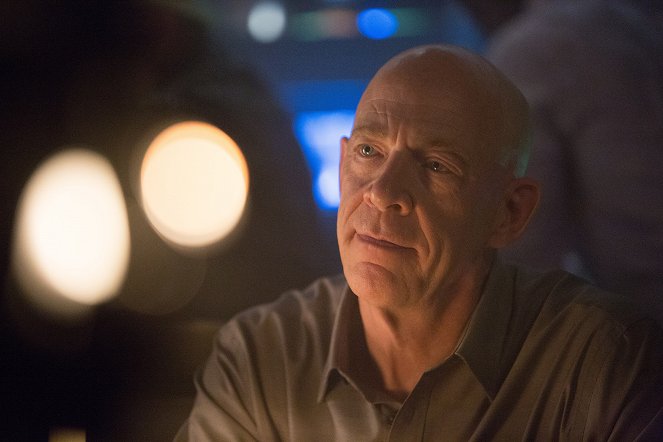Directed by:
Damien ChazelleScreenplay:
Damien ChazelleCinematography:
Sharone MeirComposer:
Justin HurwitzCast:
Miles Teller, J.K. Simmons, Paul Reiser, Melissa Benoist, Austin Stowell, Nate Lang, Chris Mulkey, Damon Gupton, Max Kasch, Jayson Blair, April Grace, C.J. Vana (more)VOD (2)
Plots(1)
Andrew Neiman is an ambitious young jazz drummer, single-minded in his pursuit to rise to the top of his elite east coast music conservatory. Plagued by the failed writing career of his father, Andrew hungers day and night to become one of the greats. Terence Fletcher, an instructor equally known for his teaching talents as for his terrifying methods, leads the top jazz ensemble in the school. Fletcher discovers Andrew and transfers the aspiring drummer into his band, forever changing the young man's life. Andrew's passion to achieve perfection quickly spirals into obsession, as his ruthless teacher continues to push him to the brink of both his ability — and his sanity. (Sony Pictures Classics)
(more)Videos (5)
Reviews (14)
A manipulative masterpiece. Actually, it has nobody to root for or to relate to – J.K.Simmons is almost a demonic caricature and Teller, with his drive to be the best of the best whatever the price, feels more like an unlikeable mule. But even with that, Whiplash is best enjoyed as an adrenaline ride where you can relish with how Teller hits those drums and Simmons screams and throws chairs at him. And then you don’t even notice those cheap crutches. 75 %
()
Spoilers ahead. Without psychologising and unnecessary plot digressions, Chazelle presents a chamber drama with the attributes of a psychological thriller whose rhythm is set by a confrontation between two very strong-willed sociopaths. The development of the narrative is as unpredictable as Fletcher’s teaching methods. As in jazz compositions, a brief release comes after the clashes escalate to the limit of a person’s physical capabilities and is soon followed by another dramatic crescendo. The way that Fletcher appears in a room, his predatory way of returning a gaze and the fact that we never see him in daylight are reminiscent of a monster from a horror movie. Under Fletcher’s influence, Andrew undergoes a transformation from a likable young man with big ambitions into a being that is as equally ruthless and indominable, a first-rate bastard, so to speak. While watching his development, we can ask whether extraordinary success must be preceded by submission and humiliation, the surrender of everything that makes us unique. In the end, Andrew may play without making mistakes, but he also plays without emotion or his own expressive feel. Does such music really represent the ideal self that he wanted to achieve? Chazelle doesn’t assert that it could be any other way in the competitive world of professional music. He doesn’t moralise or excuse the actions of either of the two main characters and, with the cynicism last demonstrated by Scorsese in The Wolf of Wall Street, he allows the two adversaries to devour each other. The film aptly references Rififi, which Andrew and his father go to see at the cinema. Like when committing a heist, there is no room for even a single ill-timed move when playing at the level Andrew desires. All parts of the body must be perfectly synchronized. It is not about the audience, but about the feeling of having full control over oneself and (essentially male) superiority over everyone else who fails to achieve the same level of precision. Like Fletcher and his obsession with tempo, Chazelle prides himself on flawless pacing. The film’s editing corresponds to the frantic drumming. The scenes set in the rehearsal room are precisely rhythmised according to Andrew’s drum hits and Fletcher’s assaults, thus transforming their (mostly) non-contact struggle into a brutal physical battle. The quick cuts between the close-ups of the musical instruments and the shots of body parts also create an effect evoking the merging of the musician with his instrument. Andrew literally lives his music. It characterises him and lends him a voice that can be heard. Therefore we hear it at the beginning before we even see the protagonist for the first time. The frenetic editing combined with the camera penetrating into the most intimate zone of the characters turns Whiplash into a very physical, horror-like experience. In a few places, the frontal assault on the senses has to be subordinated to the plausibility of the plot, into which several coincidences were not very artfully incorporated (the loss of the sheet music after Fletcher warns the musicians to guard it with their lives, the breakdown of the bus after Fletcher emphatically warns everyone to be on time for the concert). Due to the precedence of the visceral experience over probability and psychological motivations, this is not a drama of astonishing complexity, but I thoroughly enjoyed Whiplash as a thriller (on the big screen!). 80%
()
(less)
(more)
It's like a Frost / Nixon Duel, where Nixon and Nixon face each other. Not only a captivating exercise in rhythmic editing, but surprisingly unpredictable at the right moments - none of the characters (teacher or student) represents a positive or negative model here. Instead of enlightenment, creative madness takes place. Chazelle pitted two obsessed and unscrupulous bastards against each other, treating their human aspects the same way they treat each other. He bluntly throws them away as a burden and returns to them only marginally. Whiplash could have been crap in many ways - a melodrama about a boy who appreciates the power of love, a celebration of a genius who rises in a difficult struggle with his unrivaled role model, but in reality it is more of a captivating solo about the obsession and destructiveness of those who desire perfection at any cost. I appreciate that Chazelle avoids annoying genre schemes at key moments simply because he ignores any other themes and dares to uncompromisingly release scenes that we would watch for much longer in other films, and which would "characterize" the characters more and allow us to identify with them (e.g., the preparation for the final concert). Like Andrew and Terence, Whiplash pursues what it wants hard - euphoria mixed with light resistance and never-fulfilled peace between the central duo. In Star Wars terminology: the dark side has once again won. The triumph of sociopaths. That's the way it's supposed to be. Certainly not the most layered film, but definitely something like Black Swan made without a snobbish effort to be demonic. It's there from the first bar. In every tone and in every shot of photogenically dark New York. [85%] P. S. I am categorically asking for an Oscar for jazz Darth Vader.
()
Is there a line? The Black Swan of 2014. In a younger guise, with liters of sweat, blood, and tears. And with a visual side that, with its precision, cuts, and interconnection with the unrelenting rhythm, does not allow you to exhale. Every attempt at harmony, every moment when you push Andrew to finally rattle the drumsticks in a satisfying way, which will keep the demon Fletcher under control for at least a few more minutes – they always result in the same thing: accelerated breathing, tensed muscles, heightened senses. Whiplash grabs hold, crushes, and does not let go. And it chewed me up to the highest rating, because even just a few years after it was shocking, it had aged in a remarkable way. However slightly it pinched me towards the end of its time and I wanted just one more hint, today I wouldn't change anything in the movie at all. It runs at full speed the whole time and in the era of increasingly predictable academic elections or nominations, it remains possibly the last surprising choice that pleasantly caught the critical and audience public off guard. And now I'm going to catch my breath. With every longer viewing, the finale physically exhausts me more and more, although I'm afraid to even move one bit.
()
It never occurred to me that I would see such a great and well-made drama. This movie is also about music, but the focus lies on the story and the relationship between the two main protagonists. The young and talented Andrew, played in an exquisite way by Miles Teller, gets regular dressing down from the brutal conductor Terence Fletcher, who might be a bastard with the best catchphrases in this millennium. The comparison of J. K. Simmons’ role to those of other movie psychos, for example from Full Metal Jacket or Apocalypse Now, is really apt. You won’t believe until you watch this. And the hardest to believe will be the ending itself, which for me immediately became one of the most important and fundamental dramatic film endings I have ever seen. I stared at the screen and sweated for the actors. This was one of the most challenging films I've seen in a very long time... but it was worth it!
()


